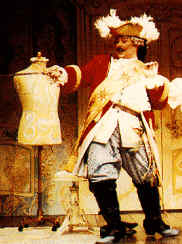| myeck's family weren't Irish. In fact, his
immigrant parents had never heard of
Ireland. That remarkable fact was only partly due to
the fanatical xenophobia practiced in their homeland - it
was mostly due to a calculated effort on the part of the
family to destroy any connection to a man so repugnant
that even myeck's family was ashamed.
He
was a swindler, a thief, a murderer, and as a child he
didn't pay taxes on his paper route money. All of these
qualities being held in high regard by the family, he was
nonetheless banished, for he was guilty of something
truly unforgivable: he looked better
in a dress than his sisters.
|
 Poor
posture plagued him his whole life, but eyewitnesses
reported that he could dance up a storm. Poor
posture plagued him his whole life, but eyewitnesses
reported that he could dance up a storm. |
Forced
to flee for his life, he took to the roads of Europe as a
highwayman, using the simple yet effective ruse of
dressing as a wandering noblewoman, his twin rapiers
disguised as somewhat oversized hatpins in an
outrageously flamboyant hat.
Finally
settling in Ireland, he adopted the name Liam Carr na
Mboscaí. Here he found acceptance among the kilt-wearing
Orangemen, and had great success robbing travelers and
hijacking trains throughout the island - after years of
British oppression, being robbed at swordpoint by a
beautiful man in a dress wasn't deemed worthy of making
much fuss over.
|
| He grew wealthy and famous. And yet, another desire had begun to grow in
his heart. Never satisfied with off-the-rack fashions, he
had been making his own outfits for years, and now, with
each rapier hole poked through his victims' waistcoats he
began to see new possibilities. Finally he gave in to his
desires and moved to Paris, where he became a fabulously
successful fashion designer - "The
Versace of his age" as a modern writer put it. |

His
slashed and perforated designs predated "Punk"
fashions by several generations. |
In
Paris, he made one final attempt at a reconciliation with
the family by inviting them all to travel to Paris at his
expense to see his Spring collection. None of his
relatives were clockmakers,
however, and they all stayed home. Family rumors held
that he committed suicide over the slight, but experts
insist that he was much more likely to make someone else
commit suicide for him. Whatever happened, he never again
made contact, and he was expunged from the family
records. |
 Poor
posture plagued him his whole life, but eyewitnesses
reported that he could dance up a storm.
Poor
posture plagued him his whole life, but eyewitnesses
reported that he could dance up a storm.


